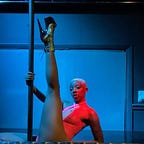Take him back!: The “Serious” Fresh Prince of Bel-Air Trailer Review
Okay, it’s Venus Retrograde so this is just your reminder to take your old nigga back if you dumped him. Lol sike, don’t do that.
But the new trailer came out for the reboot of the Fresh Prince of Bel-Air and I’m looking at the responses online and they’re a lot of folks going, “some things just need to be left alone,” or “this doesn’t feel like the real Fresh Prince to me” and it feels like a weird way of people not wanting to deal with their trauma?
Let me explain.
I’m a young Millennial. The Fresh Prince aired from September 1990 to May 1996. I was a toddler then, but cable’s long habit of syndication made it a staple of the things that were always on TV. I have a relationship with it, but it was frozen in time while I was watching it. It didn’t have the opportunity to address some things that came up after the fact.
Millennials hold an interesting place in Black culture. On one hand, we produce culture and shows like Insecure and Get Out that demonstrate our love and deep connection to representation in film and media. We’re also a generation of folks who, due to the state of the world and the Internet — come face to face with the short sightedness of our predecessors when we were being instructed to go to college and build a life. Neither of those things seem possible the way anyone knew at the time. It’s a clusterfuck of unlearn and relearn. It’s hard to tell if it’s us or the world. Or both.
It’s obvious to anybody who’s paying attention that we’re in the beginnings of a Renaissance of sorts, where we try and grapple with our love for seeing ourselves on screen but also with the reality that oppressions exist — but with a twist.
We have privilege, unimaginable to some folks around us or where we are from. And in the midst of being giddy and excited about representation we have to address that.
Now I’m not giving this reimagining too much, but I think the responses to it from folks who were a little older when the original came out are telling. The “some things need to be left alone” feels like we want to ignore that the premise of the show’s plot was actually wrought with issues of colorism, class, and Blackness.
“In West Philadelphia born and raised” is in the tune of what that time was like for Black folks. It’s catchy, but it’s context. 1985 hosted the bombing of the MOVE headquarters. If Will was 17 in Bel Air, that’s the world he was in at 12. It was a message to his coming of age — organize, provide for self, be subject to state sanctioned public violence. Up in flames, down in smoke.
There’s something to be said for resisting that memory.
One of the first things that I screamed was, “OMG A DARKSKIN HILLARY!” I loved Hillary and wanted to be her when I was little (I have prominent Libra/Taurus energy) but she didn’t look like me. The second thought I had was, “Oh shit — she’s the luxury girls. That’s gonna be a thing.”
And that’s a good thing!!! We’ve moved past flat representations of Blackness and sometimes to our own detriment (but really for the betterment) have problematized our relationships to characters, tropes, and stories. It’s both and. I’m going to really enjoy darkskinned Hillary while thinking about the roots of my investment in exclusivity of the most quality resources the world has to offer. I’m not going to choose. I’m going to participate. I’m going to organize. I’m going to reflect. There are things to do.
It’s very clear that original producers have heard the years long cries against the colorism that seemed rooted in the show (see: conflict with Janet Hubert aka darkskinned Aunt Viv). The entire cast other than Will is darkskinned so that is clearly being answered to. It is a casting choice and a commentary; “I heard you, I get it. I’ll fix it.” They fixed it.
This is a story about a young Black boy experiencing a change in class and life trajectory based on the conditions of impoverishment that sent him away, and it’s meaningful to show darkskinned people in a class position that complicates all of our existences and doesn’t pigeonhole us into an archetype that doesn’t allow for you to really see where we also have the capacity to do things wrong and systemically harm others. That’s important. What does it look like when I have the potential to be the orchestrator of oppression? I must know. How can I do anything about it if I don’t?
We are weary of representation being the only politics that some of us know, but we need to be honest that representation feels good and liberation looks different across the board. Representation is necessary. We have to tell stories to children and people after us. Art as resistance and remediation.
The point, is the story being told. And it is.
